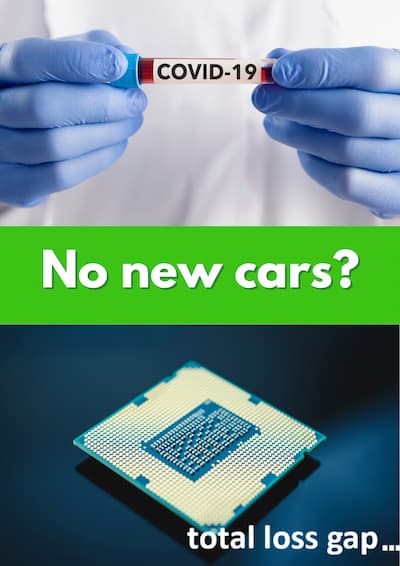Call Monday-Friday 9am - 6pm Closed Saturday & Sunday



[ Contact Us ]
Need Help? Calling from a mobile please call 0151 647 7556
0800 195 4926Do you have a question? or need help?
Call Monday-Friday 9am - 6pm Closed Saturday & Sunday,
It is no secret that new car sales are down in the UK. According to Autoexpress, the UK new car market is at its lowest ebb since 2013. The 68,033 new vehicle registrations recorded in August 2021 was 22% lower than August 2020 and nearly 8% down on the average seen in August over the last decade.
These sales figures are not, as you might expect, simply due to the fact people do not want to buy new cars. Instead, the situation has been caused by the inability of car manufacturers to make new cars to the levels that are required.
If you're looking for a new car, you may be in for a long wait!

Firstly there is an industry-wide shortage of semiconductor chips which are necessary for all modern vehicles. Global production has slowed and lead times on new cars has increased to six months or more.
Second, the Covid pandemic is also having an impact, as production rates have slowed due to health and safety concerns among factory workers. Also the 'pingdemic' issue of workers having to self isolate is reducing productivity.
Here we explore the two reasons impacting new car production, and look at how long these issues may remain.
We also look at the overall impact of a reduction of new car sales in the UK marketplace
A semiconductor chip is a silicon-based integrated circuit that consists of electronic components. It can be used to hold data and program instruction for a computer - the central processing unit (CPU).
In the automotive industry these new semiconductors have been developed in order to conserve power, reduce emissions and prevent accidents from happening.
The semiconductor supply chains are essential for new vehicle production. There is a severe global shortage that is impacting many industries, one of which is the automotive sector.
Currently there is a major shortage in electronic processing circuit boards and these problems remain significant impacting the auto- and technology market. Several major manufacturers in the auto industry are currently forced to close their production lines temporarily.
Fiesta production will stop at its Cologne plant from 23rd to 28th August. As a result the company reduced service hours between August 17th and August 19th due to shortage of raw materials. The Focus is made in the same facility. It doesn't affect the Focus production.
The fact that new vehicles need semiconductor chips in order to operate is not really news - however the industry-wide impact of these new materials is something that has come as a new issue.
If you're looking to purchase a new vehicle it is worth shopping around at different dealerships in order to find new cars that are in stock. The choice may still not be great.
With such a shortage of new cars available the market has seen car buyers shift towards buying used cars, simply because they are available.
In turn, the increased demand for used cars has seen used car values actually increase, substantially in some cases, as dealers scramble for stock to sell.
Shopping around for new vehicles online may be more time consuming, but if you are desperate for a new vehicle the current availability of new stock is problematic.
This crisis has affected companies over a year. It originally stemmed from rising demand for personal computers tablets and smartphones at the peak of Covid-19 Pandemic that diverted most supply from vehicle components.
Have you tried to buy a Playstation 5 recently?
However, the issue of short supply of chips may have been longer in the making. Industry experts were warning of a potential shortage of chips, particularly the cheaper 200mm chips, sinec before the Covid crisis struck.
An increase reliance on chips for evolving technology like 5G has only put more strain on an already stretched chip making market.
Logistical issues have also struck the chip making industry. Chip makers have closed factory's in Texas due to winter storms. A plant in Japan was also closed due to a fire.
Further complications have been seen with increasing transportation costs for the industry. Simply sending a 40ft shipping container from Asia to Europe has increased ten fold in around a year.

The Covid pandemic has already taken its toll on new vehicle production. There have been new outbreaks of sickness at manuafcturing factories.
Hundreds of new car factory workers have been isolated, unable to go into work for fear that they could catch the latest Covid virus being transmitted around new areas.
Also there has been an increase in new cases of employees needing to self-isolate because they have come down with Covid symptoms or they have been in contact with someone who has.
The process of building a new car can rely on any number of companies involved in the supply chain. A Covid related issue at any one of them can effectively bring the supply chain of new cars to a halt.
Car manufacturers are trying to work around new sicknesses by providing cold and flu remedies, as well as new vaccinations for new employees going into work .
However, the effects of the Covid pandemic on a new factory floor are new new factory sicknesses can spread quickly.
The 'pingdemic' impact of large numbers of a particular workforce has not managed to miss the motor industry.
Every car manufacture suffers because of computer chip failure. A Fleet News survey indicated that nearly 90% of fleets reported seeing vehicle delays.
Semiconductors are used anywhere from data entry systems and brake systems to parking cameras and power steering.
As a result in the shortage, several new van models are not expected until the end of 2022 VNC Automotive CEO Tony Blackie said. Blackie says that other vendors have seen more than 30 times higher chips prices. At these level they are not a sustainable use,” he said.
Tech giants Intel and IBM have both indicated they believe the semiconductor chip shortage could last another 2 years.
One thing seems certain, the semiconductor chip shortage shows no sign of ending anytime soon.